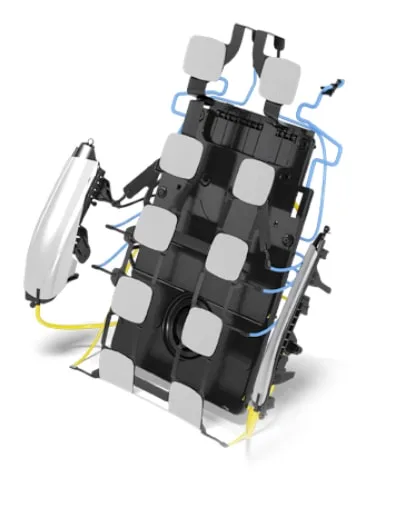Automotive Seat Comfort Solution

Innovative and cost-effective solution design
The Challenge
Find a technical solution to effectively control the inflation and deflation of the air cells of luxury car seats
CLIENT: Kongsberg Automotive
.
LOCATION: Grand-Mere, QC, and Norway
Our client, Kongsberg, a leading automotive manufacturer, was seeking to improve the comfort and convenience of their luxury car seats by integrating adjustable lumbar air supports, bolsters, and massage systems. However, they faced challenges in finding a technical solution that could effectively control the inflation and deflation of the air cells while also ensuring the safety and durability of the system.
Real-time code optimization
Functional code for seat control
Based on the NXP Kinetis microcontroller
The Solution
Partner with Orthogone for technical expertise
Kongsberg’s engineering team partnered with Orthogone’s experienced designers to develop the software architecture, testing, and integration for this new product that addresses multiple challenges, such as real-time code optimization and functional code for seat control, to create a unique design and transform their flagship product that outperforms the competition.
SOFTWARE ARCHITECTURE, DESIGN, TEST, AND INTEGRATION

The “seat comfort” project, which allows the seat’s comfort to be adjusted by several inflatable cells, requires a new alloy to manufacture the pneumatic valve, making it lighter and more compact. This solution allows more valves and inflatable cells to be concentrated in the seat, offering different adjustments: back massage, lumbar support, seat length, lateral support, shoulder, etc.
A total of more than 18 hardware platforms, supported by 22 software applications and over 30 configurations, make up the solution—reusing standard code allowed for minimal development time and a quick time-to-market.
SOFTWARE ARCHITECTURE, DESIGN, AND TEST
- Complete solution architecture
- Bootloader (NXP Kinetis MCU)
- Board Support Package (I2C, SPI, A/D, RTC, Timer, PWM, UART, LIN, CAM)
- Functional code for seat control, setting configuration, massage support, etc.
- Real-time code optimization (including assembler code)
- Interrupts optimization
- Single code base supporting multiple configurations
- Safety code (Design Failure Mode and Effects Analysis)
- MISRA compliant
- System calibration
- Manufacturing tests
TECHNOLOGY
- NXP Kinetis microcontroller
- NXP S32 MCU
- LIN / CAN communication
- SPI / I2C devices
- ADC sensor (voltage, temperature, pressure)
- PWM control signals
- Disruption management
- Code reuse
- Test with code coverage and MC/DC
- MISRA standard analysis
The Result
A highly sophisticated and reliable system that exceeds expectations
An innovative solution based on the NXP Kinetis microcontroller that uses shape memory alloy (SMA) valves and a PWM signal to control the opening and closing of the valves and regulate the flow of pressurized air to the air cells. The solution also includes temperature and voltage sensors to monitor ambient temperature and ensure the SMA wire does not exceed its temperature threshold. It also includes pressure sensors to measure ambient and air cell pressure for accurate inflation and deflation. The result is a highly sophisticated and reliable system that exceeds expectations and is a big hit with Kongsberg customers.


